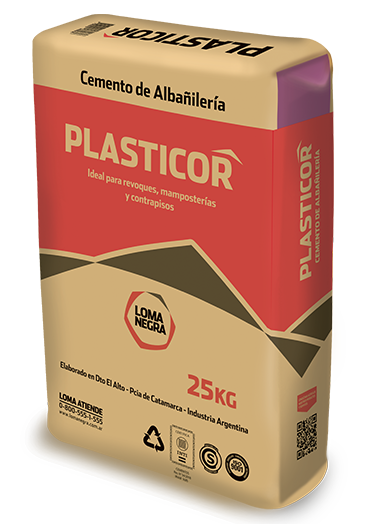MASONRY CEMENT
-Underpinning
-General masonry
-Concrete subflooring
-Lightweight aggregate subflooring
-Exterior and interior rough plastering
-Leveling screeds
-Floor tile laying
MANUAL PREPARATION
It is advisable to waterproof the surface on which the ingredients will be mixed, avoiding the loss of mixing water. The suggested dosages for masonry mixes should be consistent and uniform, ensuring good homogenization. To achieve this, it will be necessary to use identical containers to measure all the ingredients. Energetic mixing is essential to activate the air-entraining admixtures that provide the mixture with its special properties.
Avoid adding excessive water.
MACHINE PREPARATION
It is advisable to first add one part water, two parts sand, and then Plasticor. Finally, add the remaining ingredients according to the established dosage. Mixing should be done within 4 to 5 minutes, avoiding adding all the water at the beginning, since this will vary depending on the moisture content and particle size distribution. It is essential to respect the mixing time in order to activate the air-entraining admixtures that give the mixture its special properties.
Avoid adding excessive water.
General Recommendations
Follow the dosing recommendations in the dosage table.
Moisten the masonry pieces or substrates where the plastic mortar will be placed to preserve its properties.
Avoid excessive mixing water.
Protect the work from low and high temperatures.
Masonry work must be kept moist for the 12 hours following its construction.
Avoid adjusting the mortar by adding extra water or binder in response to loss of plasticity.
Do not add other ingredients to the mix.
Store the product in a dry, ventilated area, on wooden pallets, and covered with a protective film.
Plasticor Masonry Cement is a product obtained by grinding Portland Clinker, mineral additions, and additives.
Bag
IRAM 1685
For any queries or questions, please contact the Loma Negra Technical Center at asesoriatecnica@lomanegra.com
Approximate bulk density: 940 kg/m3
Approximate absolute density: 2,650 kg/m3
Average filler coefficient: 0.36 %
| Equal volumes or parts | Material for 1 m3 | |||||
| Masonry work | Plasticor | Sand | Gravel | Plasticor | Sand | Gravel |
| 0.30 m masonry | 1 | 7 | 189 Kg | 1805 Kg | ||
| 0.15 m masonry | 1 | 5 | 247 Kg | 1685 Kg | ||
| Ceramic brick masonry | 1 | 5 | 247 Kg | 1685 Kg | ||
| Load-bearing ceramic brick masonry | 1 | 5 | 247 Kg | 1685 Kg | ||
| Interior and exterior rough plastering | 1 | 5 | 247 Kg | 1685 Kg | ||
| Coarse trowel plastering | 1 | 4 | 294 Kg | 1612 Kg | ||
| Concrete subflooring | 1 | 4 | 8 | 105 Kg | 585 Kg | 1170 Kg |
| Leveling screed | 1 | 4 | 294 Kg | 1612 Kg | ||
| Tile installation | 1 | 3 | 369 Kg | 1515 Kg | ||
The dosages are adjusted according to the application coefficient of each material. In practice, some differences may occur. Material waste is not considered.

Package: Bolsa Bag.
